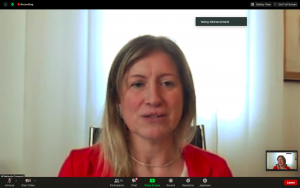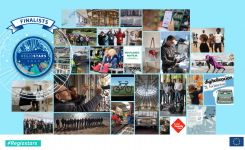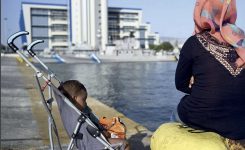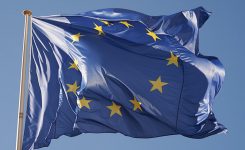Notizie
Webinar Aiccre 3 giugno, Gottardi: un futuro “Green”

Sono Sindaca di un Comune dell’Emilia-Romagna e quindi ho vissuto e sto vivendo il tema della gestione dell’emergenza e ora il tema della uscita dalla crisi e della ripartenza.
Dall’altro, svolgo questo ruolo di portavoce per il clima per il CCRE/CEMR e quindi mi si pone in maniera diretta il tema di come coniugare questi aspetti che stanno emergendo, che stanno andando avanti in contemporanea, in uno scenario dove il Covid ha scombinato le carte in tavola: avevamo uno scenario sui cui stavamo lavorando, avevamo l’obiettivo del 2030 e del 2050 e poi è subentrato il Covid. Ci troviamo di fronte a una situazione senza precedenti. Noi Sindaci, noi rappresentanti di Comuni assieme alle Regioni, eravamo e siamo attori chiave importanti per quanto riguarda il raggiungimento degli obiettivi climatici, dall’Accordo di Parigi, e premevamo e premiamo per un riconoscimento del nostro ruolo.
Dall’altro lato abbiamo visto, in maniera molto evidente, come abbiamo giocato un ruolo importante e fondamentale anche nella gestione della pandemia sia in fase emergenziale che in fase post-emergenziale. Per cui è evidente, e sempre più chiaro, che gli enti locali sono un istituto fondamentale e chiave in ogni fase sia in presenza e ancor di più dove le altre Istituzioni non sono particolarmente efficaci e quindi abbiamo lavorato e stiamo lavorando per il superamento di questa crisi sanitaria e ora dobbiamo capire cosa facciamo sugli obiettivi che ci eravamo già prefissati.
La sfida è questa: gestire contemporaneamente la crisi sanitaria e quella climatica, quindi coniugare e impostare il nostro tema di ripresa che dobbiamo realizzare focalizzandolo su un aspetto green dello sviluppo sostenibile. Mantenere l’obiettivo della decarbonizzazione da raggiungere con le tempistiche che ci siamo dati. Il fatto che oggi ci troviamo di fronte ad uno scenario diverso non deve costituire una scusa per non occuparci più delle tematiche che stavamo seguendo in tema di clima.
Un esempio concreto è quello dei mezzi di trasporto pubblico; abbiamo premuto per una mobilità sostenibile che implicava l’abbandono dell’auto privata in favore del mezzo di trasporto pubblico, ma oggi il mezzo di trasporto pubblico è un potenziale luogo di diffusione del virus, quindi qual è la risposta? Tornare sul mezzo privato? No, la risposta è investire nella mobilità sostenibile, quindi investire su piste ciclabili con finanziamenti, come sta succedendo in Italia con incentivi per l’acquisto di biciclette, di mezzi su due ruote, incentivare le sovvenzioni al bike to work, quindi sostenere economicamente chi va a lavorare in bicicletta piuttosto che con il mezzo privato. E quindi il Covid è un’opportunità per incidere in maniera più significativa sul clima attraverso la ripresa economica.
Non dobbiamo dimenticare un altro aspetto e cioè che i governi locali e regionali stanno anche affrontando un aumento delle spese e una diminuzione delle entrate perché il Covid ha reso necessario, nella fase di emergenza, la rinuncia a delle entrate fiscali. Ci sono delle spese da sostenere per riadattare i servizi sulla base delle nuove normative che sono entrate in campo per evitare che si riaccendano i focolai del Covid.
Quindi, serve un sostegno finanziario alle regioni e alle città. Gli enti locali vanno aiutati a fare investimenti futuri che contribuiscano allo sviluppo sostenibile, cioè alla lotta dei cambiamenti climatici, altrimenti sarà un’occasione persa.
Finita la crisi da Covid-19, occorre garantire investimenti locali e regionali in progetti sostenibili, come infrastrutture digitali, mobilità, trasporti, gestione delle risorse idriche, raccolta dei rifiuti, clima, ambiente. Quindi tutti quei progetti contribuiscono al raggiungimento degli obiettivi politici europei comuni.
Serve un Green Deal davvero forte, una legislazione che sia vincolante sui temi del clima perché altrimenti gli obiettivi non vengono perseguiti, servono degli obiettivi per il 2030 precisi e per il 2050 e lo stanziamento, come dicevo, di risorse necessarie, un’attenzione speciale al livello locale perché queste azioni ambiziose possano essere raggiunte e completate se partecipano tutti gli attori del settore pubblico e privato e vengono messe in campo le competenze necessarie. Quindi il Green Deal è un quadro generale sul clima, però si adatta adesso benissimo ad essere anche il piano di ripresa dalla pandemia e quindi tenere insieme la ripresa economica con le tematiche del clima.
Torno a sottolineare l’importanza, in questa sfida, del lavoro e ruolo degli enti locali, le città e le Regioni che vanno riconosciute, sostenute con le competenze, ma anche con dei finanziamenti adeguati. Quindi, il piano di ripresa europeo deve essere costruito nello spirito di solidarietà tra i paesi e l’obiettivo di costruire una società sostenibile resiliente è l’obiettivo da perseguire.
Nei prossimi mesi, gli Stati membri e il Parlamento europeo negozieranno la proposta della Commissione per il piano di risanamento e il futuro piano di finanziamento pluriennale. Entrambi questi strumenti, dovrebbero sostenere queste sfide di cui parliamo, le sfide dei Comuni e delle Regioni che dovranno appunto affrontare.
La pandemia da Covid-19 ha evidenziato, se ancora non fosse stato chiaro, che i Governi locali e regionali hanno un ruolo cruciale nell’attuazione delle misure necessarie per affrontare la crisi e così come sono attori chiave per dare risposte rapide, risposte concrete a queste crisi planetarie come quella del clima e come quella della pandemia e la crisi climatica ha ampiamente dimostrato come il livello locale sia il livello che sta facendo la differenza per agire alle sfide globali.
Se terremmo conto di questo, supereremo la crisi della pandemia, supereremo la crisi economica, supereremo speriamo anche la crisi climatica.
I am the Mayor of a Municipality of Emilia-Romagna and therefore I have lived and am living the theme of emergency management and now the theme of the exit from the crisis and the restart..
On the other hand, I play this role as spokesman for the climate for the CCRE/CEMR and therefore I am directly confronted with the theme of how to combine these aspects that are emerging, that are going on at the same time, in a scenario where Covid has messed up the cards on the table: we had a scenario on which we were working, we had the objective of 2030 and 2050 and then Covid took over.
We are faced with an unprecedented situation. We mayors, we representatives of municipalities together with the Regions, were and are important key players in achieving the climate objectives, since the Paris Accord, and we were and are rewarding and rewarding for our role..
On the other hand, we have seen very clearly how we have also played an important and fundamental role in the management of the pandemic both in the emergency and post-emergency phases. So it is clear, and increasingly clear, that local authorities are a fundamental and key institution at every stage both in the presence and even more so where the other institutions are not particularly effective, and so we have worked and are working to overcome this health crisis and now we have to understand what we are doing about the objectives we had already set ourselves.
The challenge is this: to manage both the health crisis and the climate crisis at the same time, and then to combine and set our theme of recovery, which we must achieve by focusing on a green aspect of sustainable development. Maintain the decarbonisation objective to be achieved within the timeframe we have set ourselves. The fact that today we are faced with a different scenario should not be an excuse not to deal with the climate issues we were following.
One concrete example is that of public transport; we pressed for sustainable mobility that involved abandoning private cars in favour of public transport, but today public transport is a potential place for the spread of the virus, so what is the answer? Back to private transport? No, the answer is to invest in sustainable mobility, then invest in cycle paths with funding, as is happening in Italy with incentives for the purchase of bicycles, two-wheeled means of transport, to incentivise subsidies to bike to work, then financially support those who go to work by bicycle rather than by private means of transport. And so Covid is an opportunity to have a more significant impact on the climate through economic recovery.
We must not forget another aspect, which is that local and regional governments are also facing an increase in expenditure and a decrease in revenue because Covid has made it necessary, in the emergency phase, to forego tax revenue. There are expenditures to be made to readjust services on the basis of the new regulations that have come into play to prevent Covid outbreaks from reigniting.
Therefore, financial support is needed for regions and cities. Local authorities must be helped to make future investments that contribute to sustainable development, i.e. the fight against climate change, otherwise it will be a missed opportunity.
After the Covid-19 crisis, local and regional investment in sustainable projects, such as digital infrastructure, mobility, transport, water management, waste collection, climate, environment, must be ensured. Therefore, all these projects contribute to achieving common European policy objectives.
We need a really strong Green Deal, legislation that is binding on climate issues because otherwise the objectives are not pursued, we need precise targets for 2030 and 2050 and the allocation, as I said, of the necessary resources, special attention to the local level so that these ambitious actions can be achieved and completed if all the public and private sector actors are involved and the necessary expertise is put in place. So the Green Deal is a general climate framework, but it is now very well suited to being also the recovery plan from the pandemic and therefore keeping the economic recovery together with climate issues.








